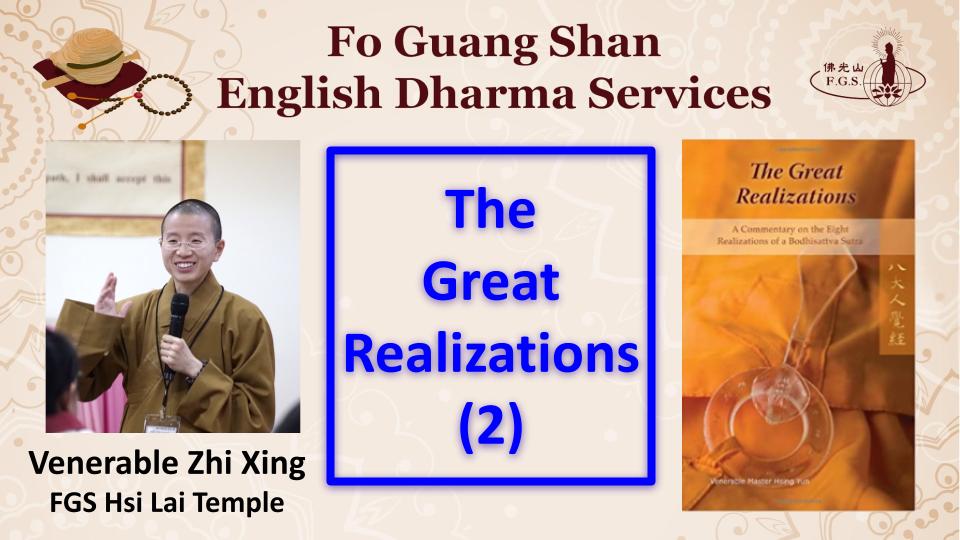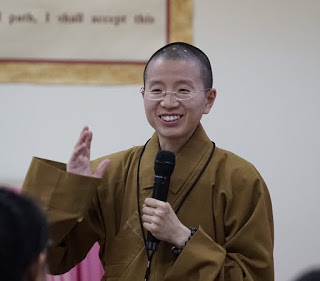
Speaker: Ven. Zhi Xing
Fo Guang Shan Hsi Lai Temple, Los Angeles
I. Introduction
Auspicious Greetings to all friends from around the world! My name is Ven. Zhixing. Thank you for joining our online English Dharma service. I will be sharing some of the teachings from the Eight Realizations of a Bodhisattva Sutra.
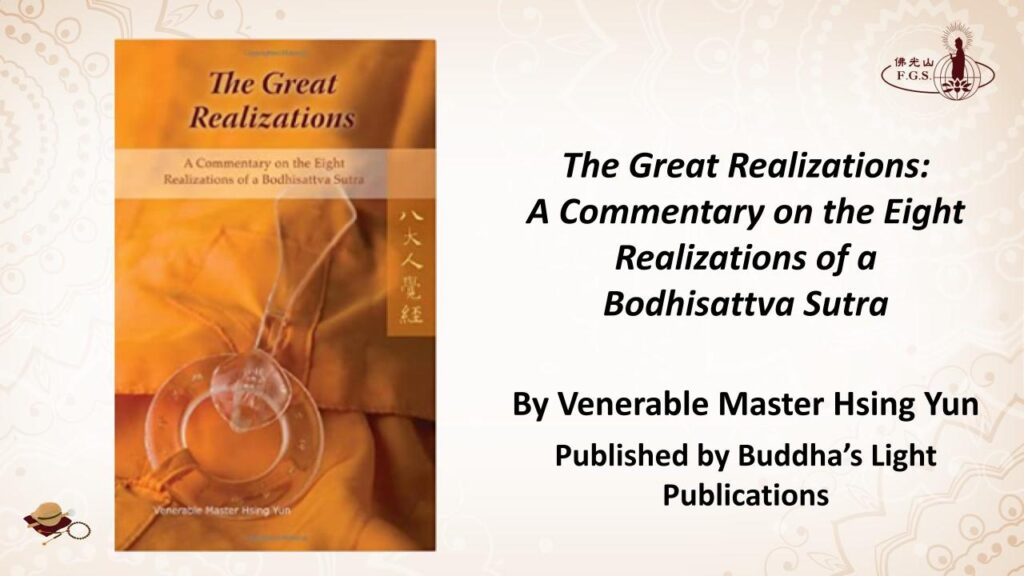
II. Second Realization
Realize that more desire causes more suffering. The weariness of the cycle of birth and death arises from greed and desire. Lessen desire and be without any wishes and the body and mind will be at ease.
III. Craving is the Cause of Suffering
An important insight to learn from this second realization is that desires and craving are the cause of suffering. Actually, in addition to the Eight Realizations of a Bodhisattva Sutra, Buddha had talked about craving being the cause of suffering in many other sutras as well. Craving is being described as “unquenchable thirst” or “the fever of unsatisfied longing.” You can imagine this scenario. Suppose we are walking in the desert and we are out of water. We crave to drink and we might drive ourselves crazy thinking about drinking. This mental turmoil where we think about drinking, look for something to drink and end up disappointed over and over again is the suffering from this unquenched thirst. This is the same for all our other cravings, which ultimately lead to our suffering in life.
As we learn that craving gives rise to suffering, it then begs the question of where does this craving come from? In one of the sutras, the Buddha said,
“And where does this craving, when arising, arise? And where, when dwelling, does it dwell? Whatever is endearing & alluring in terms of the world: that is where this craving, when arising, arises. That is where, when dwelling, it dwells.”
What is endearing and alluring in terms of the worlds? The Buddha told us it’s what we see, hear, smell, taste, touch and our thoughts. In other words, anywhere where we find it pleasant—such as sensual pleasures, wealth, power, fame, or even our own views, ideas, concepts and perceptions—we crave for. In the Commentary on the Discourse on Right View, the Buddha told us that it is through the gratification in pleasant feeling that we become enamored of that feeling. After arousing craving for that pleasant feeling, we are seized by lust for that feeling. It is a very strong force, like the force of the waterfall.
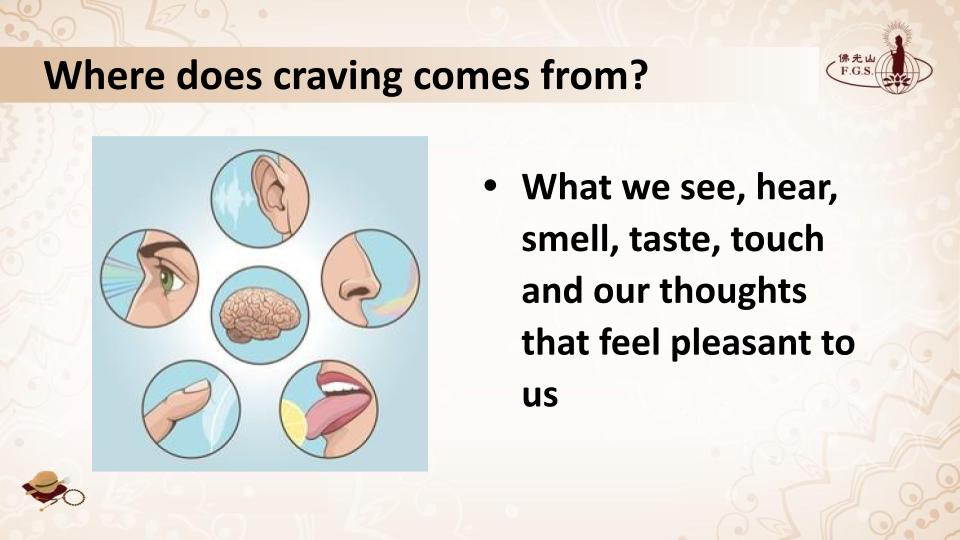
Interestingly enough, we can also understand how craving arise scientifically. According to research, the human brain is wired to reward us when we do something pleasurable. A brain chemical called dopamine is released when the brain is expecting a reward. Therefore, when we associate certain activities with pleasure whether it’s eating a favorite dessert or watching a movie, the mere anticipation may be enough to raise the dopamine levels. This not only makes us feel good, but encourages us to keep doing whatever we are doing. It teaches our brains to repeat the behavior.
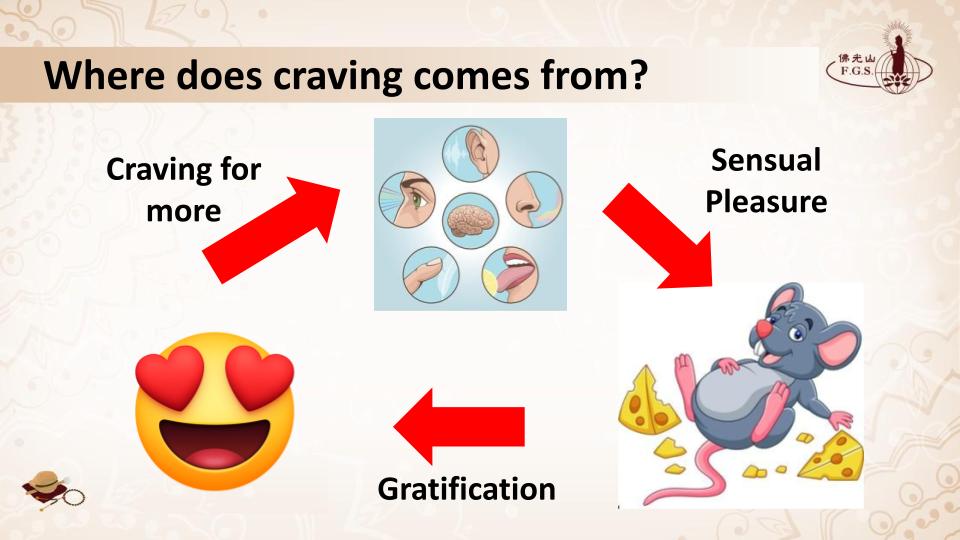
For example, suppose you like to have a fresh cup of coffee in the morning. Your brain may increase dopamine when you smell the coffee as it is being made. When you drink it, the flood of dopamine acts to reinforce this craving and focus on satisfying it in the future. Thus, we have to have a cup of coffee every morning. Now imagine that you wake up late and don’t have time to make or buy a cup of coffee in the morning, you might feel that things are not right. Your disappointment might lower your dopamine level and dampen your mood. It might also intensify your desire for coffee. Now you want it even more. Therefore, slowly, this enjoyment goes from “I want this” to “I need this” to “I must have this.
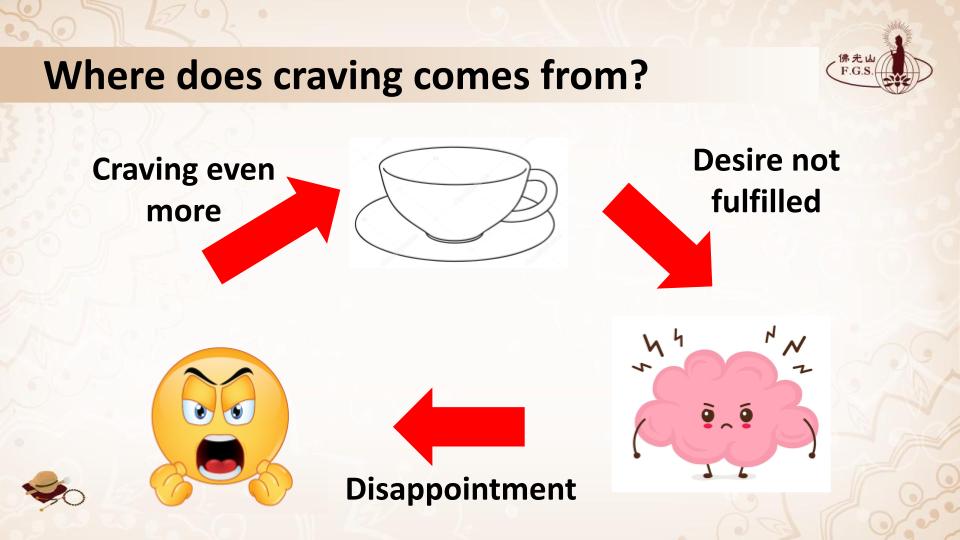
IV. Why is Craving the Cause of Suffering?
The next question we probably asked is why is craving the cause of suffering?
Craving can lead to performing unwholesome actions that harms other and might ruin one’s life, which ultimately leads to negative consequences.
Once, there were two men named Chang and Wang, who were good friends. One day, the two decided to take a walk together. On their way, they found a large piece of gold. Since they both had seen it at the same time, they decided to divide the piece of gold evenly between them.
Then Chang said to Wang, “The god of our city must have left this gold for us to find. Before we divide it, we should make an offering at the temple to show our gratitude.” Therefore, Chang went to buy some food, while Wang went to the temple to prepare. As they were on their way, craving for possessing all the gold started to eat at both men. Both of them thought, “If my friend gets half of the gold, there will be less for me!”
With the craving, Chang purchased a vial of poison with the food, while Wang concealed an axe near the table where they would eventually dine.
After they have completed their offering, as was the custom in their town, they took the food out back to eat it. As Chang poured the poison into the soup, Wang’s axe fell on his head. After Chang died, Wang decided that he might as well enjoy some soup before he left with the gold. Before he had consumed half of it, his abdomen was shot through with pain, and he died in the dirt beside his former friend’s body.
Craving can lead a person in committing unwholesome actions that harm oneself and others. If we look at the news, the root of lots of crimes is the craving a person has, whether it’s for sensual pleasure, wealth, fame or attachment to one’s views or idea
In addition, craving is like this unquenchable thirst that keep on eating at us, giving rise to our afflictions. This is like Mary who loves shopping. Shopping makes her feel happy. Thus, whenever she didn’t have a good day, she would go shopping. She feels happy at the moment; however, it also gives her worries and frustration when she sees her credit card bill. This frustration and anxiety increase as she realizes that she spent more than she make. She knows she shouldn’t go shopping anymore. Yet, her craving is tempting her all the time. She keeps on telling herself that she would stop after today, but every time she continues to go shopping. As a result, her mind goes into this turmoil, juggling between feeling happy for a very short time and going back to feeling angry at herself and feeling frustrated. This more or less happen to all of us. Craving give rises to our mental turmoil, afflictions and suffering.
V. Slave to Craving
We should take a moment to reflect upon our own life. Did I become a slave to my own desires?
Once, there was a beautiful horse, and it discovered a hill that has lots of grasses on it with a river nearby. The horse was very excited as it didn’t need to run around to find grasses and water anymore.
One day, a deer came over and started to eat the grasses. As the horse saw it, it ran over and told the deer that he had discovered the hill first. Thus, other animals shouldn’t eat the grasses on there.
The deer said, “Do you have proof that you discover the field first?” The horse replied that he will find the proof.
The horse went down the hill and asked the man who lived there to be his witness.
The man thought about it and said, “I can be your witness, but you must agree to let me ride you and put horse saddles and the bridles on you.”
Thinking of the grass field, the horse readily agreed. The man rode the horse back to the hill and told the other animals that the horse was the first to discover the field. The other animals left after hearing the man’s words, and the horse became the owner of the field. However, the man had never taken off the horse bridles and saddles afterward. The horse was forced to work everyday on the field, thus became a slave to that man.
We might think that the horse is silly. However, if we reflect upon ourselves and our desires, aren’t we doing the same thing? As we work to buy a house, a car, getting things we want or go travel, we become their slaves as well just like the horse. We go into a cycle of working hard to make money, then buy the things we want. After getting what we want, we go back to work for the next item we want, and continue on. Our cravings and desires are limitless. When are we really going to simply enjoy the moment and enjoy all that we currently have?
VI. How to Deal with Craving
How then should we work with our craving?
First of all, we should understand that not all desires are bad. The desire to help others, to do good deeds, be a good person, to learn the Dharma and attain enlightenment are wholesome desires that we should cultivate. These wholesome desires will help us discover the happiness within instead of giving us more suffering. As we help others, or do good deeds and so on, we would feel happy. We should work on wholesome desires so that they slowly become a habit and a part of our life.
Aside from working on the wholesome desires, we should practice to decrease and ultimately eliminate craving that leads to suffering.
To decrease and eliminate our craving, we should first take some time to reflect upon the following questions:
- What things or activities make me feel gratified?
- What experience give me a moment of delight?
- What do I enjoy?
- Did these activities become a daily habit?
- How do I feel when I don’t get to enjoy these things or do these activities?
- Do these cravings lead me to act or speak in a certain way?
- Do these actions or speeches lead to negative consequences?
Last, the Buddha once told us that practicing giving can help decrease and counteract our craving. Through giving, we learn to let go of this self-attachment, and our attachments to material things. Also, we will feel happy when we see others feeling happy.
Once, there was a Chan master who planted a whole garden of Chrysanthemums. After a year, the whole garden was filled with the beautiful flowers. The fragrance from the flowers attracted many visitors, and some even asked the Chan master for one. The Chan master would dig the whole plant out and gave it away. As more people came to ask for the flowers, the flowers were all gone within a few days. The garden became bare and empty.
One disciple said to the Chan master, “It’s such a pity! The whole garden should be filled with the beautiful Chrysanthemums.”
The Chan master smiled and said, “Think about it, next year, the whole village below will be filled with Chrysanthemums.” The disciple felt excited and happy upon hearing “a whole village of chrysanthemums”.
The Chan master said, “We should share all the beautiful things with others, so that everyone can feel this happiness. Even though we may not have anything, but we will feel this happiness within. This is true happiness.”
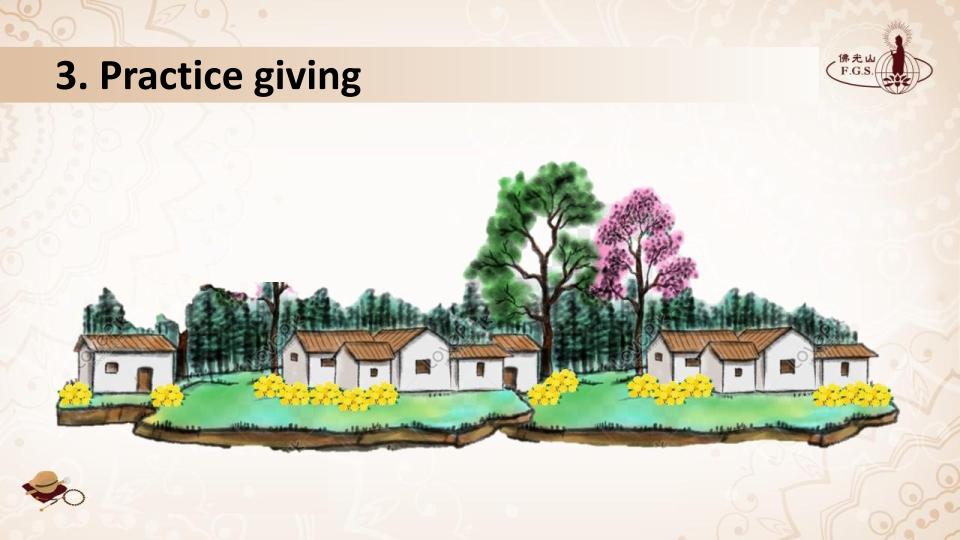
As Venerable Master Hsing Yun said, “to enjoy and appreciate is sufficient enough. We don’t need to own it.” Giving seems to only benefit others. Just like when the Chan master gave away all the flowers, he ended up with nothing. However, it actually benefits ourselves. As the Chan master said in the end, we will have true happiness within. Think about it, if we practice giving, we will nurture good relationships with others and we learn to let go. What goes around comes around. Therefore, with giving, our life will be filled with happiness and hope. Venerable Master Hsing Yun once said that Fo Guang Shan was built because of “giving”. Therefore, he taught us to practice the Four Givings: giving others faith, giving others joy, giving others hope and giving others convenience.
VII. Conclusion
To conclude, an important insight from the second realization is we should realize that craving is the cause of suffering. To work with it, we should cultivate our wholesome desires, to be mindful of the cravings that arise in our daily life, and to practice the four givings.
Last, but not least, thank you for joining us in the Dharma Service. May Buddhas and Bodhisattvas bless everyone with happiness and peace. Amitofo.

